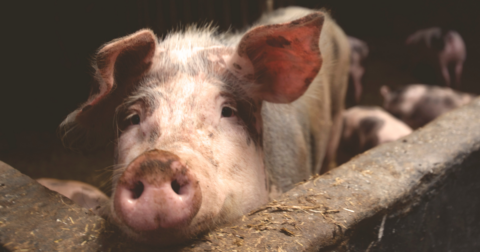Explainer
How the Meat Industry Shapes U.S. Politics (and Vice-Versa)
Law & Policy•11 min read
Reported
Courts continue to see factory farm investigations as protected free speech.


Words by Kandice Vincent
States hoping to ban undercover investigations on factory farms hit another major roadblock this year. The U.S. Supreme Court declined to hear the appeal of a decision striking down North Carolina’s “ag-gag” law. Undercover investigations are newsgathering activities, protected by the First Amendment, both the district court and 4th Circuit Court of Appeals agreed. But just what was North Carolina’s Property Protection Act, and why does it matter for the future of ag-gag legislation in the United States? We explain.
In 2015, North Carolina’s state legislature passed a law called the “Property Protection Act” — described as an “ag-gag” law for its language prohibiting undercover activities documenting workplace conditions, including factory farms. According to the Animal Legal Defense Fund, the law is technically also an “anti-sunshine” law thanks to language that went beyond agricultural activities.
Under this North Carolina law, undercover employees were prohibited from taking documents from, or recording videos of, inside their workplaces. But the North Carolina law was punitive too — property owners could sue undercover investigators and whistleblowers for monetary damages, under the argument that these activities breached a duty of loyalty to their employers.
Other states have implemented similar laws to restrict the ability of activists and journalists to investigate and report on alleged wrongdoing, but North Carolina’s law was particularly expansive in its restrictions. The law defined “nonpublic areas” where employees were forbidden from documenting conditions very broadly, even including fields where animals are grazing, for instance.
A number of groups filed a lawsuit the next year. PETA, the Animal Legal Defense Fund and a number of other advocacy organizations, initiated litigation in federal district court to challenge the law’s constitutionality under First Amendment grounds. In particular, the plaintiffs argued that the law should be struck down for violating the First Amendment right to free speech as it applied to “newsgathering activities,” which the plaintiffs argued that these documenting activities should be considered.
The law would have a chilling effect, the plaintiffs argued. Some of the organizations had plans to conduct undercover investigations in settings that keep animals — laboratories, farms and slaughterhouses among them — in hopes of documenting and exposing animal abuse and cruelty. The threat of monetary damages and legal consequences were deterring them from these newsgathering activities, which violates their First Amendment rights, the parties alleged.
The district court sided with the plaintiffs, finding the law unconstitutional. And in February, the Court of Appeals for the 4th Circuit affirmed the lower court opinion and sided with the advocacy groups.
The decision was a first for the 4th Circuit — a ruling that the ag-gag law was unconstitutional, at least in its jurisdiction, which covers North and South Carolina, Maryland, West Virginia and Virginia.
Yet the case wasn’t over. North Carolina’s Democratic Attorney General Josh Stein and the North Carolina Farm Bureau then filed an appeal o the U.S. Supreme Court in October, citing that the law was put in place to protect employers from harm — and arguing that undercover investigations like the ones planned by PETA could end up revealing unauthorized use of trade secrets.
The U.S. Supreme Court declined to hear the appeal, which means the appeals court decision stands, joining a host of other decisions striking down ag-gag laws in the U.S.
The future of ag-gag laws isn’t a bright one, at least in the United States. Federal courts continue to find that investigations of factory farms are protected by the First Amendment, which means any future laws intending to stop efforts to document conditions on industrial livestock operations are also likely to fail. In the U.S. today, only four states still have ag-gag laws on the books, though Canada is in the process of passing federal legislation.
Jared Goodman, a lawyer with PETA Foundation, told Sentient Media that “North Carolina’s misguided “ag-gag” law is just the latest of these laws to fail on First Amendment grounds. Federal courts have ruled similarly on laws passed in Idaho, Iowa, Kansas, Utah and Wyoming.
Last year, the U.S. Supreme Court declined a petition filed by Kansas’s governor and attorney general to review Animal Legal Defense Fund v. Kelly, for instance. In that case, the 10th Circuit Court of Appeals broadly struck down an ag-gag law passed in Kansas as unconstitutional.
Although ag-gag laws continue to be struck down across the country, some state lawmakers are still working to pass them. They frequently frame these laws as essential safeguards for trade secrets, personal and business privacy, and the prevention of property damage to businesses.
According to Caitlin Foley, a senior staff attorney with Animal Legal Defense Fund, “a few state legislatures, like Iowa, continue to spend significant resources and time to pass several versions of ag-gag laws.”
The North Carolina Farm Bureau’s general counsel also provided a statement to Sentient Media: “The Supreme Court’s decision not to hear our appeal in the Property Protection Act case is disappointing and troubling. Farmers and other North Carolina businesses are now more vulnerable to having their farms, offices and facilities infiltrated by fake employees and double agents. Hopefully, the General Assembly will step up again and protect our fundamental rights to privacy and property.”